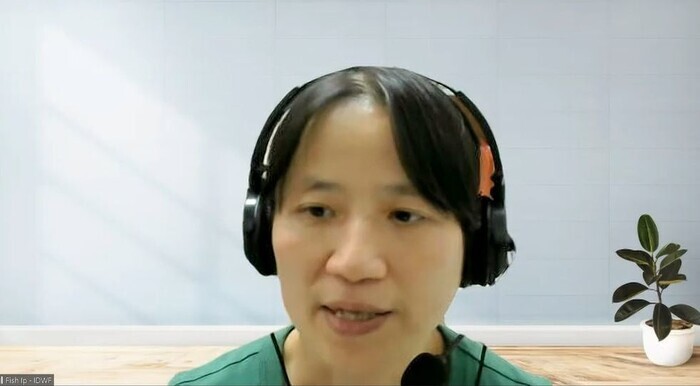hankyoreh
Links to other country sites 다른 나라 사이트 링크
Is Korea ready to protect the rights of Filipino domestic workers arriving this fall?

“I wish to ask the government if it, when proceeding with this pilot project, engaged sufficiently with the general public, organizations for migrants, and trade unions. Problems will inevitably arise without the participation of civil society and trade unions.”
During an online Zoom seminar hosted by Seoul National University’s Center for Transnational Migration and Social Inclusion on Wednesday, Fish Ip, the Asia Pacific regional coordinator at the International Domestic Workers Federation (IDWF) discussed the current status of migrant workers in Asia and expressed concern over South Korea’s pilot project for introducing Filipino nationals to work as domestic workers, which is due to start in September.
Founded in 2013, the IDWF is a labor organization that advocates for the rights of domestic workers around the world, with 88 organizations in 68 countries and more than 670,000 domestic workers as members.
Ip’s biggest concern lies in the working conditions of the workers.
“When the workers arrive in Korea, it’s important that they will be guaranteed access to relevant information, that they can work without facing abuse and exploitation, and that they know where to go for help if they are subject to abuse,” she said. “We believe that this pilot project needs to see more involvement from trade unions, civil society, and organizations for migrants.”
She also pointed out that the six-month stay allowed for domestic workers is problematic. The Filipino domestic workers will enter South Korea on a short-term employment permit system visa (E-9) and will be allowed to work in Seoul for six months, until February 2025.
“Six months is a ridiculously short period of time, and it will make migrant workers very vulnerable and difficult to unionize,” said Ip. She went on to state, “Even if for the sake of the country receiving the workers, it would be better to extend that time frame.”
Currently, Japan allows three-year contracts for migrant domestic workers, and Taiwan allows three-year contracts, which can be renewed for up to 21 years. In Hong Kong, a two-year contract can be extended indefinitely.
South Korea, which is planning to launch a pilot project for migrant domestic workers in Seoul in the second half of the year, plans to significantly expand the program in 2025.
In addition to the pilot project with Filipino domestic workers, the government plans to expand the use of migrant domestic workers through the “home care hired help system,” which exempts them from most labor laws, including those concerning the minimum wage.
By Yoon Yeon-jeong, staff reporter
Please direct questions or comments to [english@hani.co.kr]

Editorial・opinion
![[Correspondent’s column] China-Europe relations tested once more by EV war [Correspondent’s column] China-Europe relations tested once more by EV war](https://flexible.img.hani.co.kr/flexible/normal/500/300/imgdb/original/2024/0628/7617195640940814.jpg) [Correspondent’s column] China-Europe relations tested once more by EV war
[Correspondent’s column] China-Europe relations tested once more by EV war![[Correspondent’s column] Who really created the new ‘axis of evil’? [Correspondent’s column] Who really created the new ‘axis of evil’?](https://flexible.img.hani.co.kr/flexible/normal/500/300/imgdb/original/2024/0628/4017195633070654.jpg) [Correspondent’s column] Who really created the new ‘axis of evil’?
[Correspondent’s column] Who really created the new ‘axis of evil’?- [Editorial] Exploiting foreign domestic workers won’t solve Korea’s birth rate problem
- [Column] Kim and Putin’s new world order
- [Editorial] Workplace hazards can be prevented — why weren’t they this time?
- [Editorial] Seoul failed to use diplomacy with Moscow — now it’s resorting to threats
- [Column] Balloons, drones, wiretapping… Yongsan’s got it all!
- [Editorial] It’s time for us all to rethink our approach to North Korea
- [Column] Why empty gestures matter more than ever
- [Editorial] Seoul’s part in N. Korea, Russia upgrading ties to a ‘strategic partnership’
Most viewed articles
- 1CIA record confirms US ‘completely destroyed’ Seoul’s Haebangchon in 1950 bombardment
- 2After 7 years, South Korea resumes live-fire drills on islands a stone’s throw from North
- 3Nuclear South Korea back up for debate as North cozies up to Russia
- 4‘Disposable’: How illegal temp work practices push migrants in Korea into risky jobs
- 5[Reportage] On Yeonpyeong Island, residents fear military drills will snowball into war
- 6[Editorial] Exploiting foreign domestic workers won’t solve Korea’s birth rate problem
- 7Dispatched into unknown danger, foreign day laborers were defenseless against blaze
- 8How 17 km of river could be a fertile bed for NK-China-Russia cooperation
- 9[Editorial] Seoul failed to use diplomacy with Moscow — now it’s resorting to threats
- 10[Correspondent’s column] Who really created the new ‘axis of evil’?